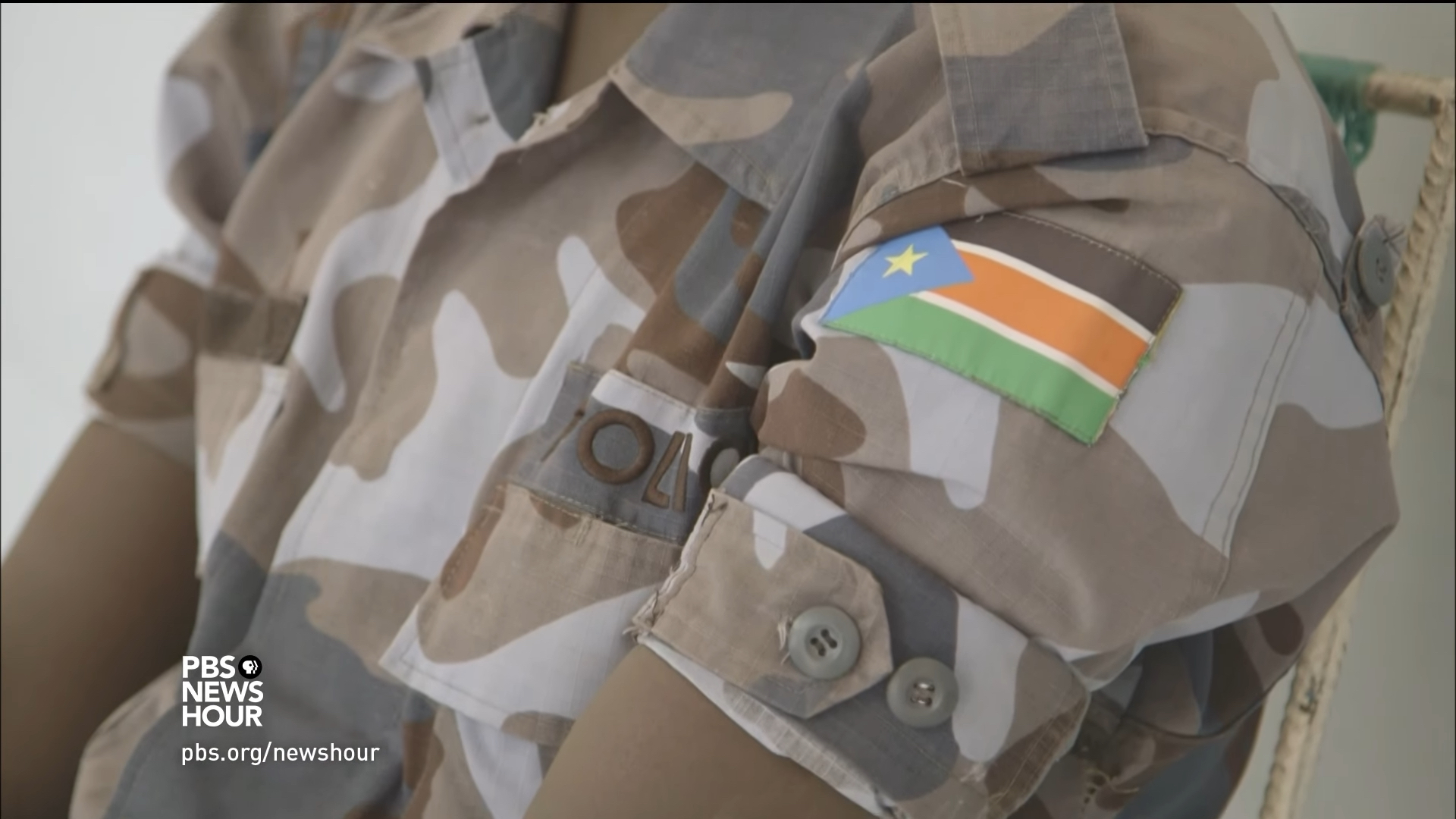
JUDY WOODRUFF: This week, we have reported on the civil war in South Sudan and the famine it has partly caused.
Tonight, a brutal, often unseen side of this conflict: an epidemic of rape, used as a weapon of war against South Sudan's women and girls.
Here again is special correspondent Jane Ferguson, and a warning: Parts of this story are disturbing.
JANE FERGUSON: The women gathering in this small building all have one thing in common: a brutal experience that binds them together.
VOICE OF INTERPRETER: When I got off the bus, they grabbed me and took me to a small house by the side of the road. Then, 10 of them raped me.
JANE FERGUSON: Linda, not her real name, was kidnapped, beaten, and raped last year by government soldiers on the streets of South Sudan's capital, Juba. At this International Rescue Committee support center, she meets with others like her.
Were they wearing uniforms?
VOICE OF INTERPRETER: Yes.
JANE FERGUSON: All of them?
VOICE OF INTERPRETER: Yes.
JANE FERGUSON: Were they carrying weapons?
VOICE OF INTERPRETER: Yes.
At first, they told us they were going to shoot us and kill us, so we were afraid. Then they beat us and raped us.
JANE FERGUSON: She was taken with six other women. Two of them were never seen again. She lives with around 30,000 others in this cramped camp for people fleeing ethnic violence. It's a huge, fortified slum in Juba where U.N. peacekeeping soldiers provide a little security.
When South Sudan's civil war broke out in 2013, it quickly became fueled by tribal divisions. President Salva Kiir of the Dinka tribe, pitted against his vice president, Riek Machar, from the Nuer tribe. Dinka government soldiers have been fighting rebels, led mostly by the Nuer tribe, all across the country.
Both sides are accused of taking part in war crimes, one of those crimes, rape. It has become a tool of war here, used with barbaric consistency, a ruthless form of collective punishment against rival tribes.
Gang-raped by soldiers, this young mother of four is now eight months pregnant.
VOICE OF INTERPRETER: This is the result of tribalism. If it wasn't, then the fight would be between soldier and soldier. But now they do this to women. They are raping women because our husbands are not here. They are rebels away fighting. When they were raping me, they kept calling me a Nuer and a rebel.
JANE FERGUSON: Soon, she will have yet another child to care for, in this desperate poverty.
The International Rescue Committee helps these women, assigning social workers to keep them going long after the physical scars fade. Yet, even here, there is no guarantee of safety.
In a war where sexual violence is so prevalent, camps like this are essential to providing some sort of protection for women. But it's not really enough. The women here know that, the moment they leave this camp, they're at risk of being raped.
Last July, fighting broke out in the capital between government troops and rebels, and very little food was making it into the camp. In desperation, mothers were forced to venture out, searching for something to feed their families.
Just a few yards from the camp gates, this woman was grabbed, tied up, and violently assaulted.
VOICE OF INTERPRETER: The children didn't have anything to eat for four days. So, I decided to go outside and look for food. I at least had a small amount of money to go outside and buy something. I went to the market, but when I was coming back, they grabbed me. They tied my hands with a piece of cloth. Then, they raped me.
JANE FERGUSON: According to women like her, rape here is often committed by gangs of government soldiers.
VOICE OF INTERPRETER: Six of them raped me, and then I lost consciousness. They left me by the road, and some people came and found me and carried me back to the camp.
JANE FERGUSON: It is an astounding fact that most of the women in this camp have been raped, the U.N. says 70 percent, the majority by government soldiers and police. None of the women we spoke to for this story has dared leave the camp since their assault.
WINNIE BYANYIMA, Oxfam International: Women who step out to look for food for their children get assaulted and raped. So, they can't step out.
They told me that: We long for peace. We want to be able to walk freely and farm and feed our families. But the solution lies in resolving the conflict.
JANE FERGUSON: The rape crisis in South Sudan is one that often gets lost in the other, more visible disasters of famine and civil war tearing this country apart.
Countrywide, it is not known how many have been raped. Women here often bury the burden of their enormous collective suffering silently.
For the PBS NewsHour, I'm Jane Ferguson in Juba, South Sudan.
JUDY WOODRUFF: Tomorrow, our focus on South Sudan continues with a look at what life is like for refugees fleeing the violence into neighboring Uganda.

Education Resource
Meet the Journalist: Jane Ferguson
Jane Ferguson, a foreign correspondent for PBS NewsHour, is based in Beirut. She has worked in the...





